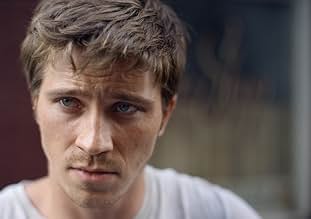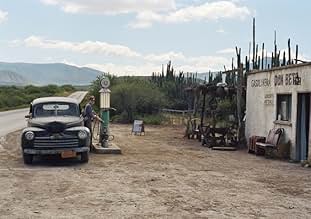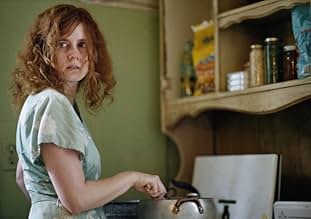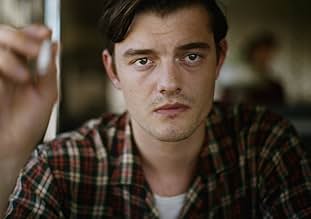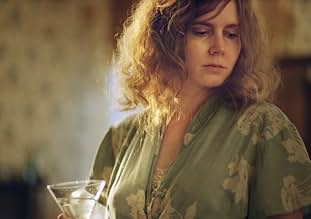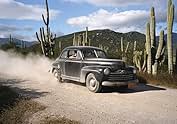Das Leben des jungen Schriftstellers Sal Paradise wird durch die Ankunft des temperamentvollen Dean Moriarty und des Mädchens Marylou erschüttert. Auf ihren Reisen treffen sie auf besondere ... Alles lesenDas Leben des jungen Schriftstellers Sal Paradise wird durch die Ankunft des temperamentvollen Dean Moriarty und des Mädchens Marylou erschüttert. Auf ihren Reisen treffen sie auf besondere Menschen.Das Leben des jungen Schriftstellers Sal Paradise wird durch die Ankunft des temperamentvollen Dean Moriarty und des Mädchens Marylou erschüttert. Auf ihren Reisen treffen sie auf besondere Menschen.
- Regie
- Drehbuch
- Hauptbesetzung
- Auszeichnungen
- 2 Gewinne & 4 Nominierungen insgesamt
- Walter's Wife
- (as Tetchena Bellange)
Empfohlene Bewertungen
Okay. Anyway..anachronisms...
I graduated high school in 1957. I remember the hair cuts for girls...I was one of them. Marylou did not wear the cut shown in the movie. No long layers. Long hair , yes, but not long layers. That's very contemporary...It's distracting. Ever hear of "pin curls?"
Restaurant servers did not start saying "Enjoy" until at least the 90's. Remember the carefully recreated restaurant toward the end of the movie...the middle aged, somewhat overweight waitress in the red uniform? Never would she have said "enjoy."
I think some of the cars seen rushing from one side of the screen to the other in the early part of the movie were not available in the late 40's. Looked like Chevys from about 1953.
So much was carefully done...the paint peeling in the old Victorians when Victorians were low rent...yes! That very restaurant mentioned above.
Come on, there are lots of us still living. Hire a consultant next time.
Making a film on such a book requires selection. Kerouac's hedonistic rampage across America, as selected by director Walter Salles, looks more mindless and sex-spiced than it did in the novel. Kerouac, as we see in his later works, was a hedonist with a conscience; a deadly combination which likely led to him drinking himself to death. Director Salles sees what he wants to see, a sex-crazed, drug-crazed, two-dimensional man. If this was truly the man represented in the novel, the novel would not have had the enduring quality that has made it literature.
I liked the way the 1950s was captured in the film. It was as close to perfection as you could get. The importance of jazz with its improvisation mirrors the lives of the travelers. The acting is good but the interaction is not. Maybe that was the point. There is no need for interaction in an age when the highest morality was based on selfishness. The movie may be okay to watch once, but I would prefer not to go down this road again.
So, everyone already knows the story well, no; chances are, if you're like me, you read the book and yet remember almost nothing of the story. The book burns through its shreds of storyline as if they were just tinder for the blaze of its energy; the real fuel is the pacing, even with all its redundancy. It's the momentum that sucks us into the breathless chaos of Kerouac's world. We come away impressed by the energy, not the content.
Film could certainly have been used to amplify this effect, but this is not that film. Instead, we have a more conventional treatment, focusing on character development. It's a nice production, with an attractive cast. But the story comes at us very differently from the book experience. The manuscript has been rewritten to add breathing space and objectivity. We see Sal Paradise, only half-formed at the start of the story, pull himself together to become a serious writer. We see the endlessly exuberant Dean Moriarity ultimately coming to grips with the progressive self- destruction attributable to his amorality, and suffering. This might be a fair reading of Kerouac's ultimate feelings about that part of his life, but it's not the feeling that Kerouac shares with us in the book. We have lost our innocence; our last chance to revisit it, even for a few hours, is taken away.
I'm not going to rage against this re-conception of the story, though, because it makes other changes from the book that might be improvements. Several episodes that were censored from the book are restored in the film. (Some discussion of this at http://www.univie.ac.at/Anglistik/easyrider/data/BeatEros.htm). So the movie is more historically accurate, and far more sexually explicit than the book. (That could also explain its delayed US release). In one poignant scene, Carlos Marx (Allen Ginsberg) is whining to Sal about how vulnerable he feels due to his poorly-returned love for Dean. To the best of my recollection, that conversation was not in the book (please tell me if you believe otherwise), but was expressed in a private letter from Ginsberg to Kerouac many years after the fact. This kind of thing changes the emotional flow of the story, certainly, but it adds depth, too.
Few of us will actually suffer nostalgia for the gritty overindulgences of the Beats. But remember, this came at a time when society was absolutely saturated with the message that everyone should be "normal," safe, predictable. Without the tiny minority of Beats attacking that message, and specifically without On The Road to chronicle that attack, the cultural revolution of the 1960's would have been even more difficult than it was, and perhaps less effective. Good, bad, or ugly, we must embrace this story.
Wusstest du schon
- WissenswertesThere have been many previous attempts to get the film made since the 1950s. Author Jack Kerouac sought to have himself play Sal Paradise opposite Marlon Brando as Dean Moriarty. In 1990, Francis Ford Coppola was set to direct with Ethan Hawke as Sal, Winona Ryder as Marylou and Brad Pitt as Dean. Later, Joel Schumacher was attached to direct with Billy Crudup as Sal and Colin Farrell as Dean. Gus Van Sant was later involved as a potential director.
- PatzerIn the opening scenes, Sal Paradise hitches a ride on the old farm truck. The large, round hay and straw bales in the background weren't available until 1972, when Vermeer built and sold the model 605 baler. Even then, the bales were much smaller and looser until the late '70s or early '80s on United States farms.
- Zitate
Sal Paradise: The only people for me are the mad ones, the ones who are mad to live, mad to talk, mad to be saved, desirous of everything at the same time, the ones who never yawn or say a commonplace thing, but burn, burn, burn like fabulous yellow roman candles exploding like spiders across the stars.
- Alternative VersionenThe film was re-edited for North American release following its premiere at the Cannes Film Festival and its French theatrical release because, according to director Walter Salles, that version was "rushed". The new cut is thirteen minutes shorter but contains more scenes and Salles says he has no preference between the two.
- VerbindungenFeatured in At the Movies: Cannes Film Festival 2012 (2012)
- SoundtracksThat's It
Composed and produced by Gustavo Santaolalla
Top-Auswahl
- How long is On the Road?Powered by Alexa
Details
- Erscheinungsdatum
- Herkunftsländer
- Offizielle Standorte
- Sprachen
- Auch bekannt als
- En el camino
- Drehorte
- Bariloche, Río Negro, Argentinien(uncredited)
- Produktionsfirmen
- Weitere beteiligte Unternehmen bei IMDbPro anzeigen
Box Office
- Budget
- 25.000.000 $ (geschätzt)
- Bruttoertrag in den USA und Kanada
- 744.296 $
- Eröffnungswochenende in den USA und in Kanada
- 39.550 $
- 23. Dez. 2012
- Weltweiter Bruttoertrag
- 9.617.377 $
- Laufzeit
- 2 Std. 4 Min.(124 min)
- Farbe
- Sound-Mix
- Seitenverhältnis
- 2.35 : 1








